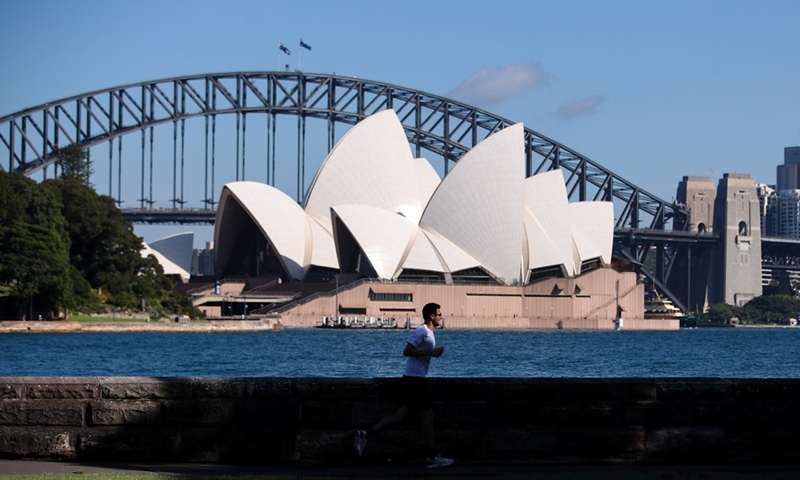
A man runs in a park opposite the Sydney Opera House in Sydney, Australia, on February 26, 2021. Photo: Xinhua
There are signs that Chinese in Australia today may be facing more challenges than they previously thought.
Recently, an average businessman from the Chinese mainland living in Melbourne had to take legal action after his application for permanent residency was rejected by the Australian government. The authorities declined his application because he was deemed a national security threat by the country's intelligent agency for his links with a non-governmental voluntary association and the contacts he made with the Chinese Consulate General in Melbourne.
It follows a report by an Australian think tank, the Lowy Institute, which revealed that Chinese in Australia were suffering from increasing discrimination, with nearly one in five respondents saying they had been threatened or physically attacked in the past year.
A diplomat at the Chinese embassy in Australia, who asked for anonymity, warned Chinese in Australia, and those who wanted to live or invest in the country, to be vigilant about discrimination, malicious accusations and their safety.
Discrimination against Chinese in Australia has increased significantly because of the tension caused by the COVID-19 pandemic and the antagonism between Canberra and Beijing.
According to a video circulating on social media, a local teenager on Friday threw racial slurs to a staff at a coffee shop in Canberra and spat on a table outside after the Chinese owner of the business tried to dissuade him from smoking inside.
The teenager left and came back, took out his mobile phone to film and told staff to get out of Australia. He also made comments related to the coronavirus, the video showed.
Although the teenager apologized via text message afterwards, the incident made local Chinese frustrated.
The owner of the coffee shop said such incidents are not unusual for them as outsiders.
The frustration in the Chinese community is partly due to the lack of attention paid by the Australian government to the claims of discrimination against Chinese and other Asians, as well as the lack of coverage in the mainstream media.
After the Floyd incident in the US last year, Australians took to the streets to protest amid the pandemic. However, the local public apparently did not pay enough attention to the discrimination incidents against Asian people in Australia.
What's more, after the Lowy Institute study showed that discrimination against ethnic Chinese was worse than expected, some Australian media focused elsewhere instead of discussing the dangers of discrimination and its root causes.
Local media, such as the Australian Broadcasting Corporation, reported that a poll showed Chinese had a higher level of trust in the Chinese government and a lower level of recognition of democracy, with 41 percent saying that, in some cases, a non-democratic regime might be better.
The reports seemed to suggest that such differences lead to discrimination against the Chinese community.
In such an environment of public opinion, there is probably no solution to the problem of discrimination against Asians in the country.
Another potential risk for Chinese in Australia is the presumption of guilt against Chinese investment and investors following the introduction of anti-foreign interference law in the country.
The case, where a businessman from the Chinese mainland working in Australia was accused of being a spy for engaging in interference activities based on groundless speculations and distorted facts, has sparked heated discussion recently.
While the case was still under trial, the Australian Secret Intelligence Service, through the Australian media, tried to determine the nature of Liu's actions. However, the report did not provide any substantial evidence of a presumed foreign interference other than photos of Liu with political figures.
China's Consulate General in Melbourne again refuted the media reports on Monday.
The consulate, according to international practice and Australian laws and regulations, cooperated with local volunteer organizations registered in accordance with the law, to safeguard the legitimate rights and interests of Chinese nationals, the consulate general noted.
"We did not, do not and will not interfere in the internal affairs of any country, nor do we accept any groundless accusations against China," it reiterated.
This is not the first time such incidents that smear Chinese community have occurred. Sidelights on media reports and evasive evidence from the intelligence services have become almost a regular narrative of the Australia's anti-foreign interference.
Jiang Yun, editor of the China Story blog at the Australian National University, said the Australian government had increasingly relied on visas and immigration decisions to fight the issue of alleged foreign interference, "with not much public information about those visa decisions, compared to prosecutions under foreign interference laws."
In fact, investment from China has greatly contributed to Australia's economic and social development.
More than 8 out of 10 Australian investors who received legal status under an Australian immigration program are from China, local media reported.
Now, as Australia's discrimination against Chinese deepens, these investors from China have been reduced to cash cows for the Australian government, and even face an unwarranted inquisition about their loyalty.
The anonymous diplomat said that under the current circumstances, it is better to seriously consider whether Australia is still the right place for Chinese people to come, and whether they want to invest in or immigrate to Australia.
